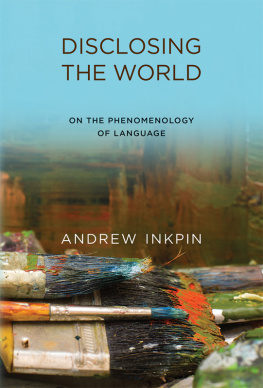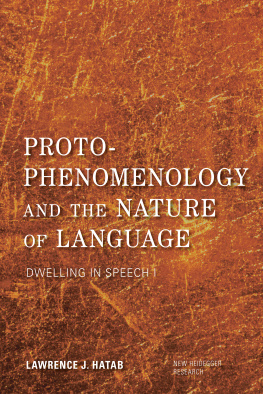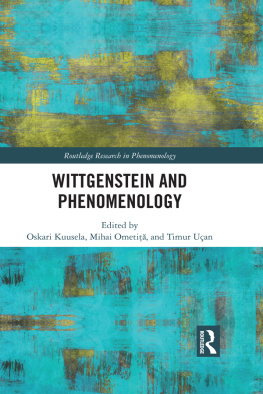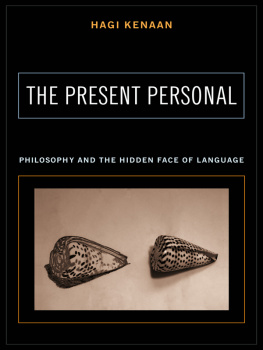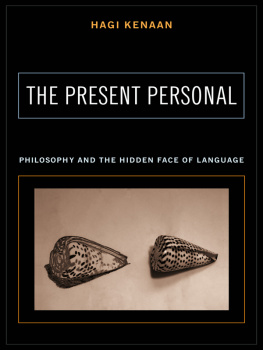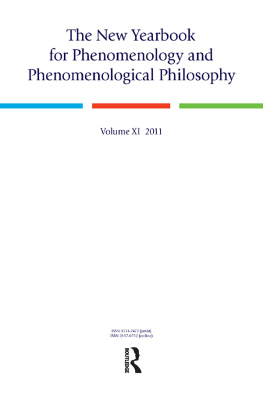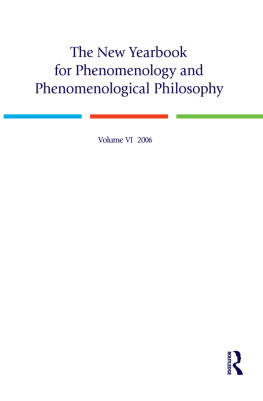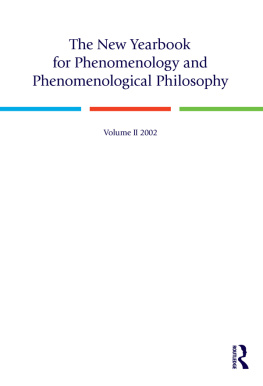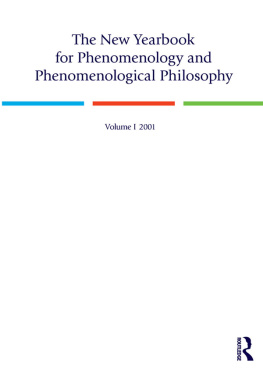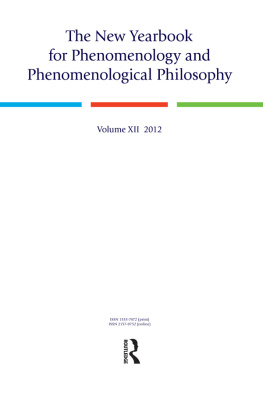IA Heideggerian Framework
IIMerleau-Ponty: The Presentational Aspect of Language
IIIWittgenstein: The Pragmatic Aspect of Language
IVSome Philosophical Implications
Disclosing the World
On the Phenomenology of Language
Andrew Inkpin
The MIT Press
Cambridge, Massachusetts
London, England
2016 Massachusetts Institute of Technology
All rights reserved. No part of this book may be reproduced in any form by any electronic or mechanical means (including photocopying, recording, or information storage and retrieval) without permission in writing from the publisher.
This book was set in Stone Sans and Stone Serif by Toppan Best-set Premedia Limited. Printed and bound in the United States of America.
Library of Congress Cataloging-in-Publication Data
Names: Inkpin, Andrew, author.
Title: Disclosing the world : on the phenomenology of language / Andrew Inkpin.
Description: Cambridge, MA : MIT Press, [2015] | Includes bibliographical references and index.
Identifiers: LCCN 2015038266 | ISBN 9780262033916 (hardcover : alk. paper)
eISBN 9780262333948
Subjects: LCSH: Language and languagesPhilosophy. | Phenomenology. | Linguistic analysis (Linguistics)
Classification: LCC P106 .I47 2016 | DDC 401dc23 LC record available at http://lccn.loc.gov/2015038266
10987654321
Fr Silvia
Pour bien apprcier les actions des hommes, il les faut prendre dans tous leurs rapports et cest ce quon ne nous apprend point faire.
Rousseau
Acknowledgments
Much of the material in this book has been a part of my life for a long time, far longer no doubt than it should have been before its publication. Most of it either formed part of or is based on my PhD thesis. Prior to that, for reasons outlined in the introduction, many of the ideas developed here haunted my daily life long before I ever thought of them as part of a philosophical project. Subsequently, the thesis material has been rediscovered, reorganized, substantially revised, extended, and hopefully improved.
As with any other work of its kind, there is a story of indebtedness to be told about this book. As these things go, it is a relatively short story, a story almost too brief to have had a happy ending. Fewer debts, so to speak, but deeper indebtedness. To begin at the end, I would like to thank Philip Laughlin at the MIT Press for his enthusiasm for the project, and Christopher Eyer, Judith Feldmann, and Elizabeth Judd for their efficient and professional help through the production process. My thanks also to the anonymous reviewers of the draft manuscript for their constructive and detailed comments and criticisms, consideration of which helped me to address at least some of its inadequacies. Some of the work in preparing the manuscript they read was facilitated by teaching relief through a Faculty Teaching Fellowship at the University of Melbourne. I am grateful to my colleagues in the philosophy discipline at Melbourne for preserving (malgr tout) an amicable and supportive working environment. I would particularly like to thank Karen Jones and Greg Restall, who have often gone far beyond the call of duty, in terms of both professional guidance and personal support, as well as Franois and Laura Schroeter for their unobtrusive willingness to help out in matters that matter.
Looking back further I wish to thank Stephen Mulhall and Peter Gallagher, my PhD examiners, for their subsequent support throughout the attritional and uncertain process of academic job hunting. Without funding from the UK Arts and Humanities Research Council my graduate studies would not have been possible and this book would not exist. This is clearly the right place, albeit belatedly, for me to gratefully acknowledge that support. As a graduate student at University College London I had the privilege and pleasure of being supervised by Sarah Richmond and Sebastian Gardner, both of whom introduced me to thethen novelexperience that academic philosophers can also be good people. Sarahs expert guidance and tact kept me on track (just about!), despite the fact that when I arrived at UCL the rules of philosophy language-games had suddenly changed and I had becomepour autruia continental philosopher. Sebastian was an inspiration as a supervisor and without his generous, unstinting, and no doubt undeserved support I would not be where I am now, and might never have ventured into the Southern Hemisphere. I am deeply grateful to both Sarah and Sebastian. My greatest all-round debt, however, is to Silvia Seja, who has accompanied this book from start to finish, and has suffered with it almost as much as I have. It is dedicated to her, of course, in the hope that in the future we will be climbing more literal and fewer metaphorical mountains.
Abbreviations
Martin Heidegger
| Logik | Logik: Die Frage nach der Wahrheit (Heidegger 1976) |
| [Logic: The Question of Truth] |
| PAA | Phnomenologie der Anschauung und des Ausdrucks (Heidegger 1993b) |
| [The Phenomenology of Intuition and Expression] |
| PIA | Phnomenologische Interpretationen zu Aristoteles (Heidegger 1985) |
| [Phenomenological Interpretations of Aristotle] |
| SZ | Sein und Zeit (Heidegger 1993c) |
| [Being and Time] |
Maurice Merleau-Ponty
| PdM | La prose du monde (Merleau-Ponty 1969) |
| [The Prose of the World] |
| PdP | La phnomnologie de la perception (Merleau-Ponty 1945) |
| [The Phenomenology of Perception] |
| S | Signes (Merleau-Ponty 1959) |
| [Signs] |
| SdC | La structure du comportement (Merleau-Ponty 2002) |
| [The Structure of Behavior] |
Ludwig Wittgenstein
| BGM | Bemerkungen ber die Grundlagen der Mathematik (Wittgenstein 1989a) |
| [Remarks on the Foundations of Mathematics] |
| BPP I | Bemerkungen ber die Philosophie der Psychologie I (Wittgenstein 1989b) |
| [Remarks on the Philosophy of Psychology I] |
| LSPP | Letzte Schriften ber die Philosophie der Psychologie (Wittgenstein 1989c) |
| [Last Writings on the Philosophy of Psychology] |
| PG | Philosophische Grammatik (Wittgenstein 1989d) |
| [Philosophical Grammar] |
| PU | Philosophische Untersuchungen (Wittgenstein 1989e) |
| [Philosophical Investigations] |
| G | ber Gewiheit (Wittgenstein 1989g) |
| [On Certainty] |
Introduction: A Phenomenological Approach to Language
The view of language presented in this book was motivated by certain kinds of experience. All of us, of course, have experience of language. But familiarity with our linguistic tools and the circumstances of their use means that words usually come to us as effortlessly as the actions they accompany or embody, so that by default we lack an articulate grasp of the various ways language mediates understanding of the world and what it is about language that enables it to do this.
In my own personal case, such default experience of language was interrupted and put in a different perspective by biographical circumstances. Shortly after the fall of the Berlin Wall I arrived in the former East Germany, where I was to spend several months teaching English, never suspecting that I would end up living, working, and studying there for nearly ten years. It was a fascinating time and place to be for many reasons, not least of which was the challenge of getting by initially with mediocre school German in a country where few spoke English (Russian perhaps). Thus over many years and in countless situations an awareness of my own linguistic competenceusually a lack of itbecame a pervasive and salient part of everyday experience. One aspect of this were the difficulties and frustration that accompany an inadequate grasp of a foreign language. The inflexibility and brittleness characterizing second-language competence impact on both your ability to act in common practical situations and the ability to formulate your thoughts. Rather than being strictly correlated, however, the link between pragmatic and linguistic competence is an ambivalent one. On the one hand, very often syntactic and semantic errors do not impede you in doing what you want to do, and an interlocutorif need be, a sympathetic onewill understand what you are saying even if your own words fail to say it. On the other hand, there are occasions when even slight changes in circumstances or unexpected variations on standardly scripted procedures bring an abrupt breakdown in pragmatic fluency by requiring linguistic knowledge that is off your beaten track. Such problems persist even with a high degree of fluency. Long after you can make yourself understood without difficulty, limitations in grammatical flexibility and a restricted vocabulary can mean that your powers of expression lack subtlety and precision, limiting your ability to articulate thoughts and leading you to sense linguistic constraints in the exercise of your intelligence.

